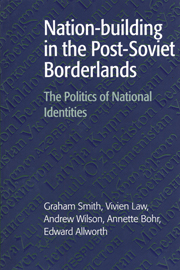Book contents
- Frontmatter
- Contents
- List of figures
- List of tables
- Preface
- The post-Soviet borderland states
- 1 Post-colonialism and borderland identities
- Part I Rediscovering national histories
- 2 National history and national identity in Ukraine and Belarus
- 3 National identity and myths of ethnogenesis in Transcaucasia
- 4 History and group identity in Central Asia
- Part II Ethnopolitics and the construction of group boundaries
- Part III Language and nation-building
- Notes
- Index
4 - History and group identity in Central Asia
Published online by Cambridge University Press: 01 June 2011
- Frontmatter
- Contents
- List of figures
- List of tables
- Preface
- The post-Soviet borderland states
- 1 Post-colonialism and borderland identities
- Part I Rediscovering national histories
- 2 National history and national identity in Ukraine and Belarus
- 3 National identity and myths of ethnogenesis in Transcaucasia
- 4 History and group identity in Central Asia
- Part II Ethnopolitics and the construction of group boundaries
- Part III Language and nation-building
- Notes
- Index
Summary
During most of the late modern and post-communist period, official guidelines or religious ideology shaped the writing of Central Asian general history. In this way, extra-historical motives constantly encroached upon what might have developed as a historiography evolving in the research, interpretation and critique appropriate to an open, educated environment. Some authors accepted such close guidance. Uncoopted historians and like-minded intellectuals ordinarily could not trust the establishment and its communications outlets to express nonconformists' interpretations and presentations of the region's history. This forced dissenters to seek alternative ways of conveying their views under rather dangerous conditions.
The following discussion about the making and writing of contemporary and very recent history in post-Soviet Central Asia examines precedents for the latest historiographic configurations and the continuing covert competition between political and cultural leaders over the basis for and nature of post-communist group identity in the region and in certain of its subdivisions.
We call this covert, because official historiography remains the order of the day, and its form persists largely as before, a collective, controlled academic enterprise amongst Central Asians themselves. This exposition contends that the political leaders of Central Asia have used the habitual method of prescription in the field of historiography persistently and purposefully. They seem to do so especially in order to divide and confuse the cultural elites of the area, and thereby stifle rival visions of imagined community – supra-ethnic or ethnic – that could strengthen and focus the foundation for group identity in the region.
- Type
- Chapter
- Information
- Nation-building in the Post-Soviet BorderlandsThe Politics of National Identities, pp. 67 - 90Publisher: Cambridge University PressPrint publication year: 1998

